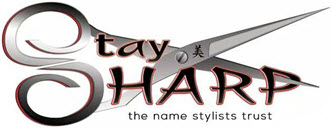What Is Rockwell Hardness ?
Rockwell Hardness: The Technical Answer
Basically Rockwell hardness is how hard a material is. They use a specific test where they put pressure against metal and when that metal dents a certain amount, it measure the Rockwell hardness. So technically, the higher the Rockwell hardness, the harder the metal is.
If the material was a knife, a high rockwell hardness would result in a knife that is less likely to get a chip or nick in it when cutting a hard material. However, if the Rockwell hardness is too high, the material is brittle and can shatter or break. So how high you make Rockwell hardness will also be determined by the type of metal you use. The lower quality metal you use, the lower the maximum Rockwell hardness you can use without the material becoming too brittle. I'm sure you have seen scissors drop on the ground and break, or a sharpener tries to balance or set a scissor and it breaks.
Now when it comes to hair scissors, it's even more complicated. You have two blades rubbing across each other. So if you have two very hard objects rubbing across each other, hundreds of times a day, and both objects are extremely hard, they dull each other very quickly. It's like a diamond rubbing across a diamond. Both are very hard and strong but they are now rubbing against each other. Also, if the blades are too hard, they don't "flex" across each other which is very important when you have convex blades with a concave or hollow grind inside. That's what makes them cut so accurately and cut from the inside out, the way they flex across each other. That is why when you look at a Hikari scissor in the closed position, there is light between the blades. Some customers think there is something wrong because there is a "gap" between blades but this is the design.
How the material is tempered is probably more important than Rockwell hardness. Hikari uses vacuum heat tempered alloys, this process makes the metal very strong and yet somewhat flexible (so it can be set and balanced and it will flex across each other). It also gives that feeling that it "cuts like a hot knife through butter" that Hikari has become famous for. Note that the tempering of a material is done in the country that the scissor is made. So if a Korea or China scissor uses Japanese steel, it is Korea or China tempering, not Japanese tempering which is a crucial part of the performance of the steel). So Japanese 440C is NOT the same on all scissors, even though its technically the same material. Each company has their own unique way of tempering the scissor, thus the different ways the material performs.
At Hikari, they have pioneered the use of stainless steel, cobalt, tempering scissors, Rockwell hardness, etc. Kazu (president of Hikari) was saying how they have and continue to experiment with different types of materials, Rockwall hardness, tempering, etc to find the perfect combination. What tempering they use also depends on the design of the scissor, type of pivot, etc. It's not a one size fits all formula. It takes years and years of experimentation and experience to find what combination will give the best performance for years to come.
Rockwell Hardness: Real Life
In the practicality of buying a good scissor, the Rockwell hardness as given by scissor companies means absolutely nothing! In the scissor world, it's more of a marketing term than anything else. Just like with the different types of steel, manufacturers can say anything they want, so even if the Rockwell hardness did make a difference, what the actual hardness is and what a company says it is, would most likely be different. I know for a fact that many scissors are NOT made of the materials that manufactures claim they are made of. There is no government agency checking the specs of scissors, so manufactures basically say whatever they want. So that is one thing to keep in mind.
There is so much that goes into how a scissor performs. But everything has to work together, the most important part is the craftsmanship. The convex edge, the concave inside, the pivot, the set or balance, how the scissor is designed and yes, the materials and hardness do play a role as well. But it's probably the least important of all the other aspects! You can get a $10 Pakistan scissor with cobalt and 61 Rockwell hardness and it will cut horrible.
So if the specs don't determine a good scissor, how do you know what to buy? The same way you would buy any expensive item like a car. You would go by past performance, reviews, reputation, test drive it, etc. Would you buy a no name car based on specs? Wow, the specs of the car are great, but the car runs horrible. It's no different with scissors. Anybody looking for specs on scissors to determine the best scissor, is really wasting their time. If I had to go out and buy a scissor right now the last thing I would do is check the specifications. I would ask other stylists what they use and their opinions and go by reputation and then possibly try the scissor myself. That's what I do on any expensive item I buy. Real world performance is what really matters. If the specs are really good, but everybody hates the product, what good is that. Likewise, if the specs are supposedly bad but you love it and everybody else does too, there is nothing wrong with that.
Industry News, Education, Scissors, Hikari Shears, Hikari, Etaro Shears, Washi Shears, Yasaka Shears, Yasaka, Best Scissors, Washi